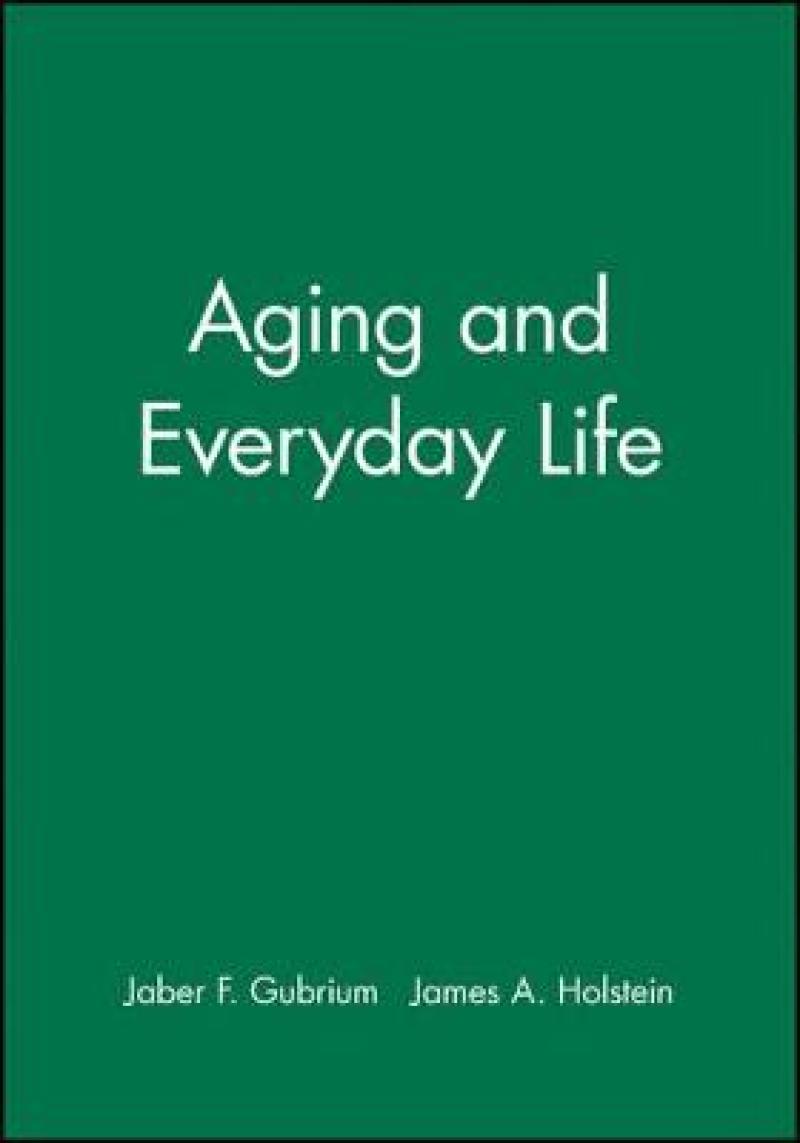"Teachers wanting a more comprehensive edited volume, offering superb critical, qualitative readings that correspond with many of the rubrics central to textbook chapters, will warmly welcome Gubrium and Holstein's Aging and Everyday Life." (Teaching Sociology, 1 October 2010)<br /> <br /> <p>"This comprehensive Reader brings together an impressive group of the foremost scholars on aging. Gubrium and Holstein's distinctive constructionist approach to everyday life presents an array of classic and contemporary readings, providing profound insights into what it means to be older in contemporary society." <i>Sara Arber, University of Surrey</i></p> <p>"Gubrium and Holstein have contributed many advances to our understanding of age and aging over the past several decades. For this volume they have assembled an impressive and accessible collection of essays that should be required reading for any introduction to gerontology class." <i>Vern L. Bengtson, University of Southern California</i></p>
This thoughtful, engaging text brings together twenty-eight essays by leading researchers in social gerontology to explore the everyday aspects of aging. Readers will come away viewing the elderly as people whose lives are as complex and diverse, and therefore as nuanced as any.
Acknowledgements.
Introduction.
Part I: Conceptualizing the Aging Experience:.
1. The Cultural Trap: The Language of Images: Haim Hazan (Tel Aviv University).
2. The Personal Trap: The Language of Self-Presentation: Haim Hazim (Tel Aviv University, Israel).
3. Further Thoughts on the Theory of Disengagement: Elaine Cumming (retired, formerly at the State University of New York, Albany).
4. A Current Theoretical Issue in Social Gerontology: Arnold M. Rose (deceased, formerly of the University of Minnesota).
5. A Continuity Theory of Normal Aging: Robert C. Atchley (retired, formerly at Columbia University).
Part II: Aging and Identity:.
6. A Decade of Reminders: Changing Age Consciousness Between Fifty and Sixty Years Old: David A. Karp (Boston College).
7. Identity Foreclosure: Women's Experiences of Widowhood as Expressed in Autobiographical Accounts: Deborah Kestin Van Den Hoonard (St. Thomas University, Canada).
8. The Ageless Self: Sharon R. Kaufman (University of California, San Francisco).
Part III: Work and Retirement:.
9. Retirement as a Social Role: Robert C. Atchley (retired, formerly at Miami University, Ohio).
10. The Unbearable Lightness of Retirement: Joel Savishinsky (Ithaca College, New York).
11. "One of Your Better Low-Class Hotels": Joyce Stephens (State University of New York at Fredonia).
"Making It": Joyce Stephens (State University of New York at Fredonia).
Part IV: Interpersonal Relationships:.
13. Friendship Styles: Sarah H. Matthews (Cleveland State University).
14. The Significance of Work Friends in Late Life: Doris Francis (formerly at the New School for Social Research, New York).
15. Filial Obligations and Kin Support for Elderly People: Janet Finch (University of Keele, UK) and Jennifer Mason (University of Leeds, UK).
Part V: Living Arrangements:.
16. Parental Dependence and Filial Responsibility in the Nineteenth Century: Hial Hawley and Emily Hawley Gillespie, 1884-1885: Emily K. Abel (University of California, Los Angeles).
17. An Old Age Community: Arlie Russell Hochschild (University of California, Berkeley).
18. Resisting Institutionalization: Constructing Old Age and Negotiating Home: Pia C. Kontos (University of Toronto).
Part VI: The Aging Body:.
19. Managing Aging in Young Adulthood: The 'Aging' Table Dancer: Carol Rambo Ronai (University of Memphis).
20. Narratives of the Gendered Body in Popular Autobiography: Mary M. Gergen (Pennsylvania State University) and Kenneth J. Gergen (Swarthmore College).
21. Stigmatizing a 'Normal' Condition: Urinary Incontinence in Late Life: Linda S. Mitteness (University of California, San Francisco) and Judith C. Barker (University of California, San Francisco).
Part VII: The Aging Mind: .
22. Geriatric Ideology: The Myth of the Myth of Senility: James S. Goodwin (University of Texas Medical Branch in Galveston).
23. Bringing the Social Back in: A Critique of the Biomedicalization of Dementia: Karen A. Lyman (Chaffey College, California).
24. The Mask of Dementia: Images of 'Demented Residents' in a Nursing Ward: Hava Golander (Tel Aviv University) and Aviad E. Raz (Tel Aviv University).
Part VIII: Caring and Caregiving:.
25. The Dependent Elderly, Home Health Care, and Strategies of Household Adaptation: Steven M. Albert (Columbia University).
26. The Unencumbered Child: Family Reputations and Responsibilities in the Care of Relatives with Alzheimer's Disease: Judith Globerman (University of Toronto).
27. Nursing Homes as Trouble: Timothy Diamond (California State University, Los Angeles).
Part IX: Death and Bereavement:.
28. A Death in Due Time: Conviction, Order, and Continuity in Ritual Drama: Barbara Myerhoff (deceased, previously at the University of Southern California).
29. Death in Very Old Age: A Personal Journey of Caregiving: Betty Risteen Hasselkus (University of Wisconsin).
30. The Social Context of Grief Among Adult Daughters Who Have Lost a Parent: Jennifer Klapper, Sidney Moss, Miriam Moss (all Philadelphia Geriatric Center), and Robert L. Rubinstein (University of Maryland, Baltimore).
Index.
This thoughtful, engaging text brings together twenty-eight essays by leading researchers in social gerontology to explore the everyday aspects of aging. Readers will come away viewing the elderly as people whose lives are as complex and diverse, and therefore as nuanced, as any.
Produktdetaljer
Biografisk notat
Jaber F. Gubrium is Professor of Sociology at the University of Florida. He is editor of the Journal of Aging Studies and the author or editor of twenty books, including Oldtimers and Alzheimer's (1986), Speaking of Life (1993), and Living and Dying at Murray Manor (1997).James A. Holstein is Professor of Sociology at Marquette University. He is the author or editor of numerous books, including Court-Ordered Insanity (1993), Reconsidering Social Constructionism (1993), and Social Problems in Everyday Life (1997). He also is co-editor of the research annual Perspectives on Social Problems.
The editors have previously collaborated on What is Family? (1990), The Active Interview (1995), The New Language of Qualitative Method (1997), Constructing the Life Course (2000), and The Self We Live By (2000).
